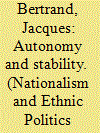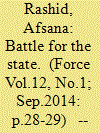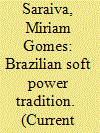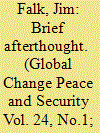|
|
|
Sort Order |
|
|
|
Items / Page
|
|
|
|
|
|
|
| Srl | Item |
| 1 |
ID:
098326


|
|
|
|
|
| Publication |
2010.
|
| Summary/Abstract |
Most of the advanced democracies agree that confidentiality is needed in
terms of technical performance parameters; the numbers to be procured
and methods of deployment, which may provide unique advantages to the
user. Instead of the military or the civil servants treating these aspects
exclusively as military capability issue, legislative intervention is needed
for professionalizing and institutionalizing public accountability of security
sector. Parliamentary processes have constitutional legitimacy and duty
to examine security sector accountability. It however, lacks resources,
capacities and political will to do so.
|
|
|
|
|
|
|
|
|
|
|
|
|
|
|
|
| 2 |
ID:
131988


|
|
|
|
|
| Publication |
2014.
|
| Summary/Abstract |
Autonomy is often seen as an institutional instrument to manage substate nationalist conflict. Its implementation is key in determining its impact on conflict. While the central state might be satisfied with the absence of violence and stability as a measure of success, an aggrieved group will view success as gaining new powers and new resources. Autonomy often unravels when different goals are being pursued during implementation. "Special autonomy" in Papua failed because, first, the law was not the product of negotiation but of a solution that the central government imposed; second, Papuans remained divided on its utility and, ultimately, failed to seize the opportunity provided; third, the central government undermined the law in its attempts to curb secessionism, ultimately failing to make it credible.
|
|
|
|
|
|
|
|
|
|
|
|
|
|
|
|
| 3 |
ID:
133485


|
|
|
|
|
| Publication |
2014.
|
| Summary/Abstract |
With the State Assembly elections round the corner, mainstream political parties and separatists here are gearing up with their respective agendas. Many new political equations and alliances are expected to come to the fore in the upcoming polls, in Jammu and Kashmir, slated at the end of this year.
The contest will be close for several stalwarts and many new faces will emerge on the political horizon of the state. Though bijli, pani and sadak (electricity, water and roads) will remain the main focus of the election manifesto of several political parties, resolution of Kashmir issue, abrogation of Article 370 (that provides special status to the state of Jammu and Kashmir) and rehabilitation for Kashmiri Pandits will find equal importance on their respective agendas. Prof. Farooq Fayaz, a prominent historian, author and director Academic Staff College, University of Kashmir, observes that apart from focusing on good governance, all political parties have their own roadmaps to follow
|
|
|
|
|
|
|
|
|
|
|
|
|
|
|
|
| 4 |
ID:
127600


|
|
|
|
|
| Publication |
2014.
|
| Summary/Abstract |
Over the past decade, amid growing international fragmentation and declining US hegemony, Brazil has assertively expanded its participation in multilateral forums as part of a diplomatic strategy that envisions a reformulation of international institutions. At the same time, Brazil has also worked on building a leadership role within South America. These global and regional aims continue to shape the country's use of soft power. Indeed, soft power-defined by the political scientist Joseph S. Nye Jr. as influencing the behavior of others via attraction or persuasion rather than coercion or payment-is nothing new in Brazil's international dealings. Since the early 1900s, the nation has used such a strategy under different labels in conjunction with two beliefs central to its foreign policy: the need to build and assure Brazil's autonomy in its development strategy and foreign policy choices, and the desire to raise its global political profile
|
|
|
|
|
|
|
|
|
|
|
|
|
|
|
|
| 5 |
ID:
109866


|
|
|
| 6 |
ID:
134129


|
|
|
|
|
| Publication |
2014.
|
| Summary/Abstract |
This article examines the contemporary press environment and existing research on the press-including the role of new media in Armenia, Azerbaijan, and Georgia. In the early 1990s, these successor states emerged from the dismantled Soviet empire to form new governments, press systems, and other national institutions. Each was nominally committed to developing free enterprise-based economies and democratic governance. The article discusses the press after they became part of the U.S.S.R., critiques the three national press environments, and examines how rapid expansion of social media use is blurring traditional definitions of journalism. Last, it concludes that significant obstacles remain to development of functional, effective press systems that can maintain economic and political autonomy and plurality in the South Caucasus.
|
|
|
|
|
|
|
|
|
|
|
|
|
|
|
|
| 7 |
ID:
124486


|
|
|
|
|
| Publication |
2013.
|
| Summary/Abstract |
An important issue in considering violence at both the conceptual and empirical levels is the question of what counts as "violence" and how it is acknowledged. In many polities of the Middle East, including Palestine, Iraq, and Afghanistan, there is no clear boundary between war and peace. Conflicts have lasted over a long period and even the project of securing a future in which the struggle for decolonization and political autonomy can be kept alive faces enormous hurdles as everyday life is corroded by betrayals, accusations, and the sheer exhaustion of keeping political energies from waning. Most acute observers of prolonged conflicts recognize the corrosive effects of these conflicts on everyday life. In this brief thought piece, I want to reflect on one aspect of the problem: that of the relation between sexual violence as an aspect of dramatic and spectacular violence-in wars (including modern ones), pogroms against ethnic or religious minorities, or episodes of lethal riots between sectarian groups-and everyday forms of sexual violence that could be both part of the public domain and constitutive of domestic intimacy. Said otherwise, I am interested in how experience of violence travels from one threshold of life to another.
|
|
|
|
|
|
|
|
|
|
|
|
|
|
|
|
|
|
|
|
|